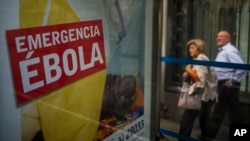A Spanish nurse who is the first person to contract Ebola outside of Africa may have touched her face with the gloves of her protective suit while caring for a priest who died of the disease, a doctor treating her said on Wednesday.
The nurse, Teresa Romero, was being treated for the deadly infection at a Madrid hospital while Spanish officials launched an investigation into how she was able to contract Ebola despite strict protocols for handling contagious patients.
The virus, which has killed more than 3,400 people in West Africa since March in the largest outbreak of the disease on record, causes haemorrhagic fever and is spread through direct contact with body fluids from an infected person.
While Romero is the only confirmed Ebola case in Spain aside from two priests who contracted the disease in Africa and died, more than 50 other people who may have had contact with the virus in the country are currently being monitored, including primary health care and hospital staff, European officials said.
“She has talked to me about the gloves, she touched her face with the gloves. That's what she remembers and what she has told me three times,” German Ramirez, one of the doctors at Carlos III hospital where the nurse is being treated, told reporters.
The nurse took leave from work immediately after Spanish missionary Manuel Garcia died on Sept. 25. Wearing a full protective suit, she had entered the priest's room once while he was alive and once after his death to clean the room.
“I believe the error was made when taking off the suit,” she told Spain's El Pais newspaper in a telephone interview published on Wednesday. “I see that as the most critical moment, when something could have happened. But I'm not sure.”
Health worker union officials said Romero alerted hospital staff three times to say she had a fever and a rash, but because her temperature had not gone above 38.6 degrees Celsius the hospital did not see her as a risk.
Calls for Calm
European officials said Spain had informed the EU that of the 50 people monitored, five “high risk contacts” - including a doctor who dealt with the infected nurse at a primary health care clinic, three ambulance workers and the nurse's husband - are being “actively surveyed” by the public health services at home.
Spanish Prime Minister Mariano Rajoy defended his country's health authorities and urged people not to panic.
“We have to be alert and keep calm right now,” he said.
Rajoy said he had created a committee to oversee co-ordination between the regional Madrid government, the central government and European institutions.
“Let the professionals do their work,” he said. “The Spanish health system is one of the best in the world.”
Two experts from the Stockholm-based European Center for Disease Prevention and Control (ECDC), which monitors disease in the region, have gone to Spain to help with the investigation, a spokesman for the European Commission said.
The spokesman said Spanish authorities had told the EU it was “not clear at this stage how infection occurred”, but that it may have been due to “possible relaxation” of protocols for handling the corpse or for the disposal of medical waste.
The Commission's health security committee gathered representatives from all EU states, the ECDC and from the World Health Organization's European regional headquarters to discuss the situation on Wednesday.
The Commision said that with the repatriation of people with Ebola from West Africa likely to continue and with “the possibility of an incubating case arriving in the EU”, the committee had agreed on “the need to strengthen the information to returning travelers and to health professionals to ensure that they can recognize cases of Ebola fever at an early stage”.
Mandatory Screening
The WHO's Europe director Zsuzsanna Jakab told Reuters in an interview on Tuesday it was “unavoidable” that Europe would see more cases of Ebola within its borders because of the busy travel links between Europe and the worst affected West African countries of Guinea, Liberia and Sierra Leone.
She stressed, however, that the continent is well prepared for handling Ebola virus disease, and said she did not expect to see any widespread outbreaks in European countries.
Nevertheless, travelers arriving in the United States from Liberia, Sierra Leone and Guinea will face mandatory screening measures for the deadly virus as soon as this weekend, CNN reported, adding screening could be extended to other nations.
Countries in West Africa are supposed to screen passengers before they are allowed to depart. Under the new measures such travelers will also have to answer questions and have their temperature taken with a hand-held scanner once they arrive in the United States, CNN said.
A new World Bank assessment of the potential impact of the epidemic estimated that if it spread wider from the three states into neighboring larger economies, the two-year regional financial impact could reach $32.6 billion by the end of 2015.
“A swift policy reaction by the international community is crucial,” the report said.
The Madrid regional government on Tuesday had ordered a dog belonging to the nurse and her husband to be put down because it lived in close contact with someone infected with Ebola.
“According to scientific information, Ebola antibodies have been found in dogs, indicating dogs can carry the virus in their blood although they do not show symptoms,” the government said in a statement, adding there was no guarantee that dogs do not transfer the virus through bodily fluids.
However, the order did not appear to have been carried out on Wednesday as photographers at the couple's apartment saw the dog alive and well on the balcony.
